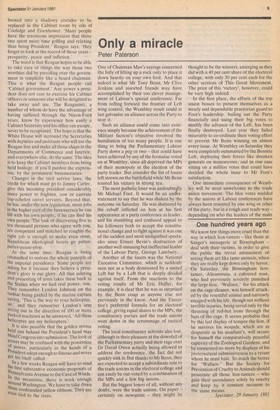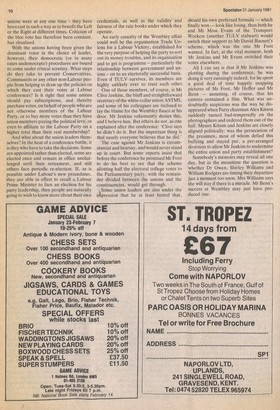Only a miracle
Peter Paterson
One of Chairman Mao's sayings concerned the folly of lifting up a rock only to place it down heavily on your own foot. And that indeed is what Mr Tony Benn, Mr Clive Jenkins and assorted friends may have accomplished by their too, clever manage, ment of Labour's special conference. Far from rolling forward the frontier of Left wing control, the Wembley result could at last galvanise an alliance across the Party to stop it.
Such an alliance could come into existence simply because the achievement of the Militant faction's objective involved the humiliation of too many people. It is one thing to bring the Parliamentary Labour Party down a peg or two that could have been achieved by any of the formulae voted on at Wembley, since all deprived the MPs of their monopoly in the election of the party leader. But consider the list of losers left strewn on the battlefield while Mr Benn toasted his victory in strong tea.
The most pathetic loser was undoubteplly Mr Michael Foot. It would he an understatement to say that he was shaken by the outcome on Saturday. He was shattered by the rebuff inflicted on him at his first appearance at a party conference as leader, and his stumbling and confused appeal to his followers both to accept the constitutional change and to fight against it was one of the saddest and most undignified spectacles since Ernest Bevin's destruction of another well-meaning but ineffectual leader of the Labour Party, George Lansbury.
Another of the losers was the National Executive Committee, which is suddenly seen not as a body dominated by a united Left but by a Left that is deeply divided against itself. From the reactions to the voting results of Mr Eric Heifer, for example, it is clearthat he was as surprised by the Benn coup as anyone else not previously in the know, And the Executive's preferred formula for an electoral college, giving equal shares to the MPs, the constituency parties and the trade unions went down in the scrummage of tactical voting.
The local constituency activists also lost, although in their pleasure at the downfall of the Parliamentary party and their rage over Dr David Owen actually being allowed to address the conference, the fact did not quickly sink in.But thanks to Mr Benn, they are expected to accept a Subordinate role to the trade unions in the electoral college and can easily be out-voted by a combination of the MPs and a few big unions.
But the biggest losers of all, without any doubt, were the trade unions. On paper certainly on newsprint they might be thought to be the winners, emerging as they did with a 40 per cent share of the electoral college, with only 30 per cent each for the other sections of This Great Movement. The price of this 'victory', however, could be very high indeed.
In the first place, the efforts of the top union bosses to present themselves as a steady and dependable praetorian guard to Foot's leadership, bailing out the Party financially and • using their big votes to modify the advance of the Left, has been finally destroyed. Last year they failed miserably to co-ordinate their voting effort to prevent Mr Benn winning on almost every issue. At Wembley on Saturday they were completely outsmarted by the Bennite Left, deploying their forces like drunken generals on manoeuvres, and in one case sitting on a million votes that could have decided the whole issue to Mr Foot's satisfaction.
One immediate consequence of Wembley will be most unwelcome to the trade union movement. The bloc votes wielded by the unions at Labour conferences have always been resented by one wing or other of the party, but in a rough and ready waydepending on who the leaders of the main unions were at any one time – they have been cast in such a way as to benefit the Left or the Right at different times. Criticism of the bloc vote has therefore been constant, but ritualised.
With the unions having been given the dominant voice in the choice of leader, however, their democratic (or in many eases undemocratic) procedures are bound to come under critical scrutiny. What steps do they take to prevent Conservatives, Communists or any other non-Labour people from helping to draw .up the policies on which they cast their votes at Labour conferences? Is it right that some unions should pay subscriptions, and thereby purchase votes, on behalf of people who are not otherwise members of the Labour Party, or to buy more votes than they have union members paying the political levy, or even to affiliate to the Labour Party on a higher total than their real membership?
And what about the union leaders themselves? In the heat of a conference battle, it is they who have to take the decisions. Some are appointed rather than elected, some are elected once and remain in office unchallenged until their retirement, and still others face periodic re-election. If, as is possible under Labour's new procedures, they are able in effect to recall a Labour Prime Minister to face an election for his party leadership, then people are naturally going to wish to know more about their own credentials, as well as the validity and fairness of the rule books under which they operate.
An early casualty of the Wembley affair could well be the organisation Trade Unions for a Labour Victory, established for the very purpose of helping the party to sort , out its money troubles, and its organisation and to get is programme – particularly the relationship between government and unions – on to an electorally successful basis. Even if TULV survives, its members are highly unlikely ever to trust each other.
One of those members, of course, is Mr Clive Jenkins, the bluff and straightforward secretary of the white-collar union ASTMS, and some of his colleagues are inclined to lay the blame for the Wembley fiasco at his door. Mr Jenkins vehemently denies this,' and I believe him. But others do not, as one explained after the conference: 'Clive says he didn't do it. But the important thing is that nearly everyone believes that he did.'
The case against Mr Jenkins is circumstantial and hearsay, andwould never stand up in court. But some reports insist that before the conference he promised Mr Foot to do his best to see that the scheme allotting half the electoral college votes to the Parliamentary party, with the remainder divided between the unions and the constituencies, would get through.
i Some union leaders are also under the ittpression that he at least hinted that, should his own preferred formula — which finally won — look like losing, then both he and Mr Moss Evans of the Transport Workers (another TULV stalwart) would switch their support to Mr David Basnett's scheme, which was the one Mr Foot wanted. In fact, at the vital moment, both Mr Jenkins and Mr Evans switched their votes elsewhere.
All I can say is that if Mr Jenkins was plotting during the conference, he was doing it very cunningly indeed, for he spent a good deal of time happily snapping pictures of Mr Foot, Mr Helfer and Mr Benn — assuming, of course, that his camera contained a film. What Was undoubtedly suspicious was the way he disappeared when Party chairman Alex Kitson suddenly turned bad-temperedly on the photographers and ordered them out of the hall. Messrs Kitson and Jenkins are closely aligned politically: was the persecution of the pressmen, most of whom defied this bullying and stayed put, a pre-arranged diversion to allow Mr Jenkins to undermine the entire union and party establishment?
Somebody's memoirs may reveal all one day, but in the meantime the question is whether Dr Owen, Shirley Williams and William Rodgers are timing their departure just a moment too soon. Mrs Williams says she will stay if there is a miracle. Mr Benn's success at Wembley may just have produced one.







































 Previous page
Previous page